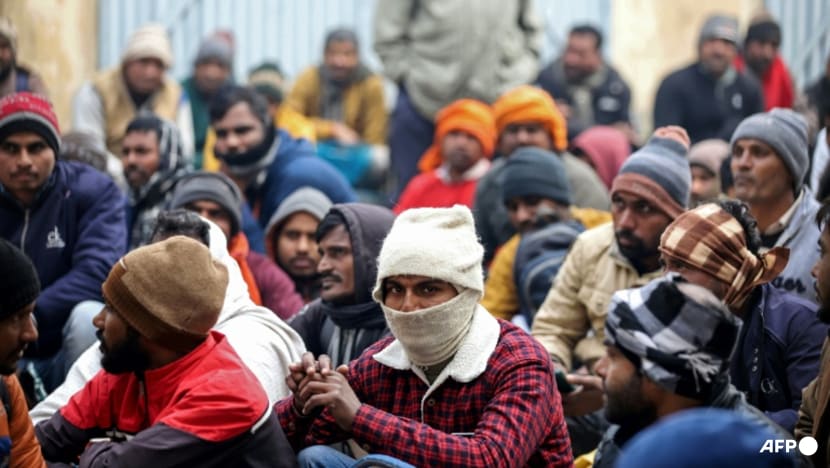India election: How will youth unemployment impact PM Modi as he seeks a rare third term?
Nearly 83 per cent of the country’s unemployed are its youth, according to a recent report by the International Labour Organization.

India is the fastest-growing major economy, but there are still not enough white-collar jobs for its educated youth (Photo: AFP/Naeem ANSARI).

This audio is generated by an AI tool.
NEW DELHI: Political parties in India will have to successfully woo the country's youth to win the ongoing election, said observers.
More than 65 per cent of India's 1.4 billion people are below the age of 35. For many of them, unemployment is the most pressing issue in the world's most populous country.
India has failed to create enough jobs for its expanding young population, and joblessness is among the economic challenges affecting Prime Minister Narendra Modi’s re-election bid.
UNABLE TO CREATE JOBS
A recent report released by the International Labour Organization (ILO) in March painted a grim picture of the employment scenario in India, especially among its youth.
The Indian Employment Report 2024, produced with the Institute for Human Development, highlighted that nearly 83 per cent of the country’s unemployed are its youth.
The report further found that one in three Indians aged 15 to 29 is not working, schooling, or in training.
The government has rejected these figures, saying they did not account for gig workers and those working part-time.
On the other hand, observers agreed with the report that the benefits of being the world's fastest growing major economy are not trickling down, saying the government has not been able to generate jobs for the unskilled and the poor.
This has forced most of the country's population to work in the agricultural or informal sectors, where wages are low and there is little job security.
But analysts stressed that India needs to be realistic about its job creation problem.
“Every month, 1 million new jobseekers are joining the job market, so just to ensure that the unemployment rate does not go up, you have to create a million jobs a month,” said Mr Sujan Hajra, executive director and chief economist at financial services firm Anand Rathi.
“One of the biggest advantages for India is demography, so if we cannot exploit that advantage, then that advantage can become a nightmare. So that definitely is a big issue, and obviously it fuels social unrest.”
TOUGHER TO SECURE WORK
The ILO report pointed to a mismatch between the education of young people and the jobs created. It noted that employers have found a shortage of young people with specific skills.
When CNA visited a training centre run by non-profit organisation UNNATI in New Delhi, many young people from lower income families were looking to acquire relevant skills and stand out in a saturated market.
They had been unable to find formal employment, either in the government or private sector.
While some were trying to learn spoken English, others were picking up tips on how to crack interviews. Some youths were also there to learn basic computer skills.
Jobseeker Anam Mansoor said: “Companies want people who can speak English fluently. So they are hiring not on the basis of talent but on the basis of skills, and the skill in greatest demand is the ability to speak in English.”
Another jobseeker, Mohammad Ragib, had been on the lookout for a job for months.
The 19-year-old had tried to find work as a teacher, at a call centre, and in hotels as a service staff, but had not been successful.
“There is too much competition in India because of our population size,” he said. “They will post vacancies for two positions, but it will invite 10 applicants.”
UNEMPLOYMENT MAY DETERMINE YOUTH VOTE
On the political front, some young people claimed they would not vote for Mr Modi’s ruling Bharatiya Janata Party (BJP) because of the unemployment crisis.
The BJP denies that there is a jobs crisis, and urges youths to become job creators not seekers.
Meanwhile, the opposition Indian National Congress has promised to fix the job market.
Congress leader Rahul Gandhi said that if the party is voted into power, it will fill 3 million vacancies in government jobs. It will also introduce a scheme to provide guaranteed paid apprenticeships to graduate and diploma holders aged under 25, he added.
Experts believe the government should focus on producing more jobs in the services sector.
“Services are extremely labour-intensive,” said Mr Hajra. “So I think the focus should be to create gainful employment opportunities and improve productivity (and) the skill levels.”
In 2014, before Mr Modi won his first term, he had promised to create 10 million jobs a year.
Now, as he seeks a historic third term, his party manifesto touches on creating jobs through investments and promises unimaginable opportunities - but without putting a number to it this time.
Young BJP supporters said the lack of jobs is not Mr Modi's failure, and there is nothing to fear.
“Modi has done a lot,” said one supporter. “The onus is on the youth of the country to study, work hard and find a job. If we can't, then we will be unemployed.”
Another supporter said: “People want to sit at home and not work hard. If you don't make an effort, then the fault is yours.”















